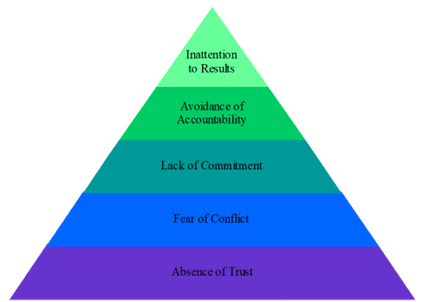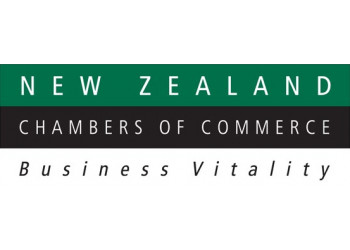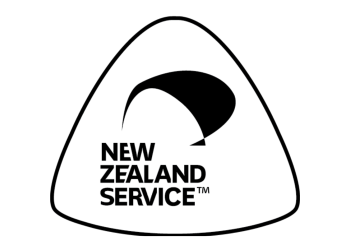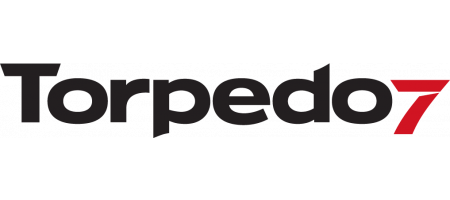
News
The Five Dysfunctions of a Team
How would you describe the performance of your management team? If it is below par, could this be attributed to team members displaying ‘dysfunctional’ behaviours? Have you ever considered what might be preventing you from achieving the results you are after?
I frequently come across leadership teams which could be described as dysfunctional, with the following examples as the types of behaviour often observed:
- a lack of genuine commitment to group decisions
- passive aggressive behaviour driven by frustration.
- a fear of being honest with each other
- a lack of trust
- a ‘passing the buck’ culture i.e. ‘well it was not my team that was responsible, so that is not my problem.’.
- a focus on personal agendas versus wider business objectives.
These behaviours can be very visible to an organisation which can be damaging for that team’s respect.
If you have not already come across his work, let me introduce you to Patrick Lencioni's model titled 'The Five Dysfunctions of a Team'. This describes the five key dysfunctions which are very common in management teams and often go undetected or more commonly simply, unmanaged.
With the economic conditions continuing to place pressure on businesses, it is imperative management teams are succussing in focusing on working towards the same outcomes. If such dysfunctional behaviour lurks in your team, addressing this behaviour needs to be a priority. This may cause some members being uncomfortable -but that is the point. Many of us need to challenge comfort zones just like a team needs too in order to better their performance.
A quote from Patrick: “Teamwork remains one sustainable competitive advantage that has been largely untapped.”
Below is Patrick’s model, further explained by the following: “The true measure of a team is that it accomplishes the results that it sets out to achieve. To do that on a consistent, ongoing basis, a team must overcome the five dysfunctions listed here by displaying the behaviours described for each one.
- Dysfunction #1: Absence of Trust: Members of great teams trust one another of a fundamental, emotional level, and they are comfortable being vulnerable with each other about their weaknesses, mistakes, fears, and behaviours. They get to a point where they can be completely open with one another, without filters and with no repercussions.
- Dysfunction #2: Fear of Conflict: Teams that trust one another are not afraid to engage in passionate dialogue around issues and decisions that are key to the business’s success. They do not hesitate to disagree with, challenge, and question one another, all in the spirit of finding the best answers, discovering the truth, and making great decisions.
- Dysfunction #3: Lack of Commitment: Teams that engage in unfiltered conflict are able to achieve genuine buy-in around important decisions, even when various members of the team initially disagree. That’s because they ensure that all opinions and ideas are put on the table and considered, giving confidence to team members that no stone has left unturned.
- Dysfunction #4: Avoidance of Accountability: Teams that commit to decisions and standards of performance do not hesitate to hold one another accountable for adhering to those decisions and standards. What is more, they don’t rely on the team leader as the primary source of accountability, they go directly to their peers.
- Dysfunction #5: Inattention to Results: Teams that trust one another, engage in conflict, commit to decisions, and hold one another accountable are very likely to set aside their individual needs and agendas and focus on almost exclusively on what is best for the team. They do not give in to the temptation to place their teams, career aspirations, or ego-driven status ahead of the collective results that define team success. “
So, do any of these seem familiar? Do you help to address them?

So, if we have learnt to trust one another; engage in healthy conflict; commit to decisions they make, and hold one another accountable for those decisions, there is a pretty good chance your team will be a success. Teams are made up of extremely imperfect human beings so getting support to get results can be really helpful.
Logan HR can facilitate workshops with teams to assess and help them identify these dysfunctions and then to work on addressing these. With the first step to assess where they are at to where they need to get to and to seek feedback along the way.
These workshops are a great way to pull a team together, to refocus, to learn more about each member of the team and to make their roles in that team much more satisfying and successful.
We can also look at how you are measuring your management team’s performance. What metrics are you using? Do you have a ‘scorecard’? And how transparent are you with the wider business in communicating these? i.e. taking ‘public’ accountability.
If you want to know more, give Kate Logan a call 021 906 577 to discuss.


























